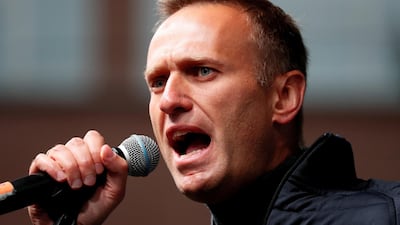Jailed Russian opposition politician Alexei Navalny said on Friday he would gradually end his hunger strike after receiving proper medical attention.
Mr Navalny said doctors warned him that his continued protest, which has lasted for more than three weeks, would put his life at risk.
The Kremlin critic started his hunger strike on March 31 after saying prison authorities had refused him access to a doctor of his choosing despite his complaints of acute back and leg pain.
But in an Instagram post, Mr Navalny said the strike could end after he was examined by non-prison medics, calling it "huge progress."
He said it would take him 24 days to gradually end the hunger strike and thanked the "good people" in Russia and around the world for their support.
"Thank you – I have now been examined twice by a panel of civilian doctors ... they are doing tests and analyses and giving me the results and conclusions," he said.
“Thanks to the huge support of good people across the country and around the world, we have made huge progress.”
The worsening health of Mr Navalny, President Vladimir Putin's most prominent domestic opponent, triggered a western diplomatic offensive aimed at persuading Moscow to make concessions.
Authorities at the IK-2 correctional facility about 100 kilometres east of Moscow – where Navalny is serving a two-and-a-half-year sentence for a conviction he and his supporters say is politically motivated –– said they had offered him prison medical care but that he had refused the care.
His supporters said he refused it because it was substandard and, in some cases, outdated and dangerous.
Thousands of Mr Navalny's supporters protested in cities across Russia on Wednesday to demand he receive proper care and be freed. The US told Moscow it would face consequences if he died in jail.
Mr Navalny survived a poison attack with a nerve agent last year, which Russia denied carrying out.


